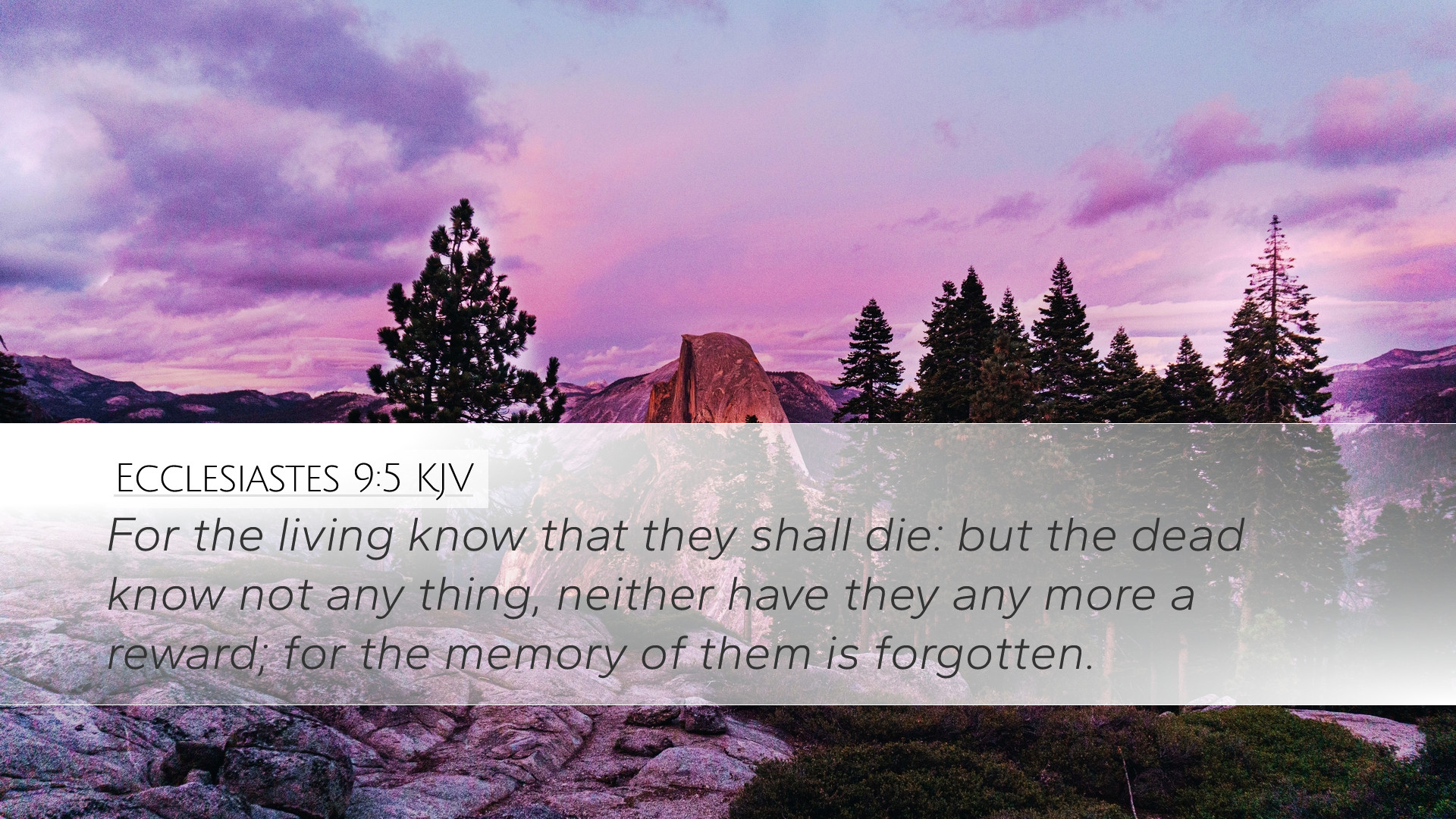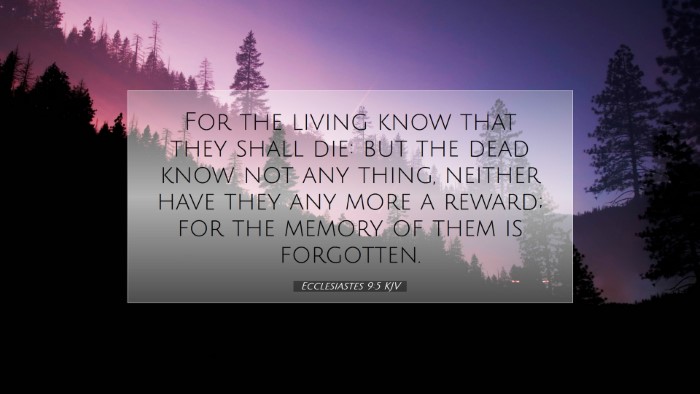Commentary on Ecclesiastes 9:5
Verse: "For the living know that they will die, but the dead know nothing; they have no more reward, for the memory of them is forgotten."
Introduction
The verse Ecclesiastes 9:5 presents profound reflections on mortality and the nature of life and death. It serves as a reminder of the transient nature of human existence and the inevitability of death. Public domain commentaries provide valuable insights into this philosophical observation by Solomon, offering pastoral guidance, theological reflection, and practical applications.
The Living and the Dead
Matthew Henry observes that this verse starkly contrasts the states of the living and the dead. He emphasizes that the living possess awareness of their mortality, fostering a sense of urgency to live wisely and with purpose. The dead, however, are in a state of oblivion regarding their earthly lives. This awareness should prompt believers to treasure life as a gift from God and to engage in meaningful endeavors.
The Knowledge of Mortality
Albert Barnes highlights the notion that "the living know that they will die" signifies an understanding of human limitations. This realization shapes one's perspective, underscoring the need for wisdom in daily living. It calls for an awareness of the transient pleasures of life while encouraging the pursuit of eternal values. The knowledge of mortality inspires individuals to live righteously, for it cultivates a healthy fear of God.
Human Existence and its Temporal Nature
In his commentary, Adam Clarke reflects on the fact that human existence is ephemeral. He notes that the phrase "they have no more reward" indicates the finality of death where earthly rewards cease to have significance. Clarke argues that the teachings of Solomon serve as reminders that life should not be wasted on vain pursuits, as worldly gain is ultimately fleeting.
The Role of Memory
Further expansion on the concept of memory can be seen in Henry's commentary. He elaborates that the memories of the deceased fade over time, which underscores the impermanence of human recognition and status. This realization prompts a deeper inquiry into what legacy one leaves behind. The pursuit of a lasting impression on the hearts of the living transcends mere reputation, requiring a focus on righteous living and impactful witness.
Theological Implications
This verse also bears significant theological implications regarding the afterlife. The dead’s state of knowing nothing may suggest a need for embracing the hope of resurrection and eternal life. Barnes cautions against interpreting this as a finality of existence; instead, it serves as a call to live in light of eternity. Ecclesiastes invites its readers to consider how their lives harmonize with their beliefs about life after death.
Applications for Spiritual Leadership
For pastors and spiritual leaders, Ecclesiastes 9:5 serves as a foundational text for teaching on the nature of life and death. It highlights the importance of imparting wisdom on mortality to congregations, urging them to engage in spiritual disciplines that prepare them for eternal realities. Pastoral care can focus on helping individuals explore their understanding of death, leading them toward a more profound relationship with God.
Summary of Key Insights
- Acknowledgment of Mortality: The acceptance of one's mortality engenders a purposeful life.
- Eternal Perspective: Living with an awareness of eternal truths allows individuals to prioritize spiritual over temporal concerns.
- Legacy of Righteousness: The importance of leaving behind a legacy that reflects one's faith values rather than earthly accolades.
- Hope in Resurrection: The dilemma of mortality prompts reflection on the hope promised in Christ and the assurance of eternal life.
Conclusion
Ecclesiastes 9:5 succinctly captures the human experience of living in the light of death. It challenges believers to confront their mortality while holding onto the hope of life beyond the grave. Drawing from the insights of esteemed commentators, this exploration emphasizes the need for a life rooted in wisdom, purpose, and a lasting legacy of faith. Shaping our understanding of death provides a framework for effective ministry and a meaningful life that honors God.


